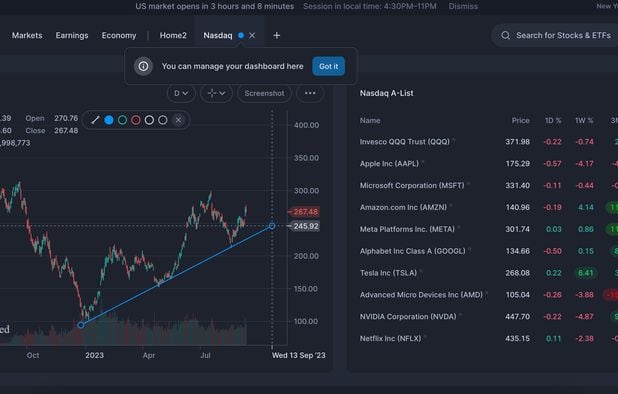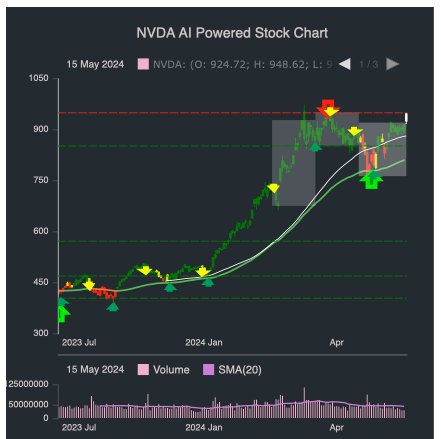20 Excellent Facts For Selecting AI Stock Trading Platform Sites
20 Excellent Facts For Selecting AI Stock Trading Platform Sites
Blog Article
Top 10 Ways To Assess The Customer Support Of Ai Software For Predicting And Analyzing Stocks
Support from the customer can be an important factor when choosing an option for AI analysis of stocks or stock predictions. A responsive and reliable support team can make a big difference in solving problems, optimizing platforms' usage, and ensuring a smooth trade experience. Here are 10 top tips to evaluate the support provided by these platforms.
1. Evaluation of the support available
24/7 Support: Ensure that your platform has 24/7 customer service. This is especially important when trading in real-time as well as global markets.
Hours of operation If you don't have 24/7 support, be sure support is available for you during business hours.
Make sure that support is available during holidays and weekends.
2. Test Response Times
Initial response. Contact customer support and ask them a sample question to see how fast they can respond.
Time to resolve The problem: Don't just acknowledge the problem, but also determine the time it will take you to fix it.
Live chat If live chat is available Test its response time and efficiency.
3. Examine the Support Options
Multi-channel support: Make sure the platform supports you via multiple channels (e.g. email or phone call live chat, email, and social media).
You can check your preferred channel to see if it is accessible and reliable.
Self-service options are offered: Search for a comprehensive FAQ, a community forum or a vast knowledgebase to resolve your issues quickly.
4. Evaluate the Support Quality
Support agents must be well-informed about trading platforms, technical issues and platform.
Problem-solving: Evaluate whether support agents are able to effectively solve complicated issues or escalate them as needed.
Professionalism: Check if support interactions are friendly and professional. They should also be helpful.
5. Find Dedicated Client Managers
Premium support: Check to see if those on premium plans, or who are institutional users, have access a dedicated account manager.
Account managers must provide individual assistance and provide proactive advice.
Relationship building: Ensure that account managers are available to establish relationships that last for a long time.
6. Review the Support Documentation
Knowledge base - Ensure that the platform provides a well organized and searchable knowledge base with tutorials. guides, and tips for troubleshooting.
Video tutorials: Check whether there are any video tutorials available.
API documentation If you're a developer check if the platform offers precise and clear API documentation.
7. Review the Community Support and Peer Support
Forums for users - Look to see if the platform has a community or forum in which users can share ideas and discuss solutions.
Social media groups: Find non-official social media groups (e.g. Reddit. Facebook. LinkedIn) that discuss the platform.
Community engagement: Find out if the team of your platform actively participates in forums or discussions within the community.
8. Evaluate Escalation Processes
Issue escalate. Make sure that you have a clearly defined procedure for reporting unresolved matters to managers or other staff members at the top.
Follow-up: Verify that support has followed up on a concern once it was resolved to confirm that the issue was fully completed.
Feedback loops: Check the capability of the platform to gather user feedback to improve the support service.
9. Test Support in critical situations
Contact the support team in high-risk times to assess their responsiveness.
Technical issues: Simulate a tech issue (e.g. login issue or data discrepancy) to test how support responds.
Trade execution - Make sure that support is in place to help with urgent trade-related issues (e.g. orders not being executed, delays with execution).
10. Review Feedback from Users on Support
Online reviews: Research reviews of users on platforms such as copyright, G2, or Reddit to gauge general satisfaction with support.
There are testimonials available about positive experiences by searching for case studies or testimonials.
Complaints: Check how the platform handles complaints and negative feedback about support.
Bonus Tips
Support during trial time Test the support of the platform with the demo or free trial period.
Language support. If you do not speak English ensure you confirm that support is provided in the language of your choice.
Training and onboarding: Check whether the platform provides onboarding or training sessions to help new users get up and running.
These tips will help you evaluate the customer service of AI stock-predicting/analyzing trading platforms. So you'll be able choose a platform with reliable prompt and friendly support. Support from the customer that is prompt and friendly can improve the overall experience. Read the recommended ai trading tools url for more tips including ai stock trading app, ai stock picker, best ai trading app, ai investing platform, using ai to trade stocks, ai for investment, best ai trading software, best ai for trading, ai investing app, ai stock trading app and more.
Top 10 Tips On Assessing The Regulatory Conformity Of Ai Stock Predicting Trading Platforms
Compliance with regulatory requirements is an essential aspect to consider when considering AI stock predicting/analyzing trading platforms. Compliance assures that a platform adheres to financial regulations, and adheres to legal frameworks and protecting the user's data. This lowers the possibility of legal or financial issues. These are the top ten suggestions for assessing the regulatory compliance of these platforms:
1. Verify licensing and registration
Regulatory bodies: Make sure the platform has been licensed and registered with the relevant financial regulatory agencies (e.g. SEC in U.S.A., FCA UK, ASIC Australia).
Verify the broker partnership. If the platform integrates brokers, make sure they are properly licensed and regulated.
Public records: Go to the site of the regulator to determine if the platform has been licensed or if it's any time violated the law.
2. Assessment of the data privacy Compliance
GDPR: If you are operating or serving users within the EU ensure that the platform is compliant with the General Data Protection Regulation.
CCPA - California Consumer Privacy Act: Check for compliance with California users.
Policies on handling data: Review the platform's data privacy policy to ensure it outlines the ways in which user data is gathered as well as how it is stored and shared.
3. Review Anti-Money Laundering(AML) Measures
AML policies: Ensure that the platform is able to abide by AML policies that are in place to detect and prevent money laundering activities.
KYC procedures - Ensure that the platform complies with Know Your Customer procedures for verification of user identities.
Transaction monitoring: Check if the platform monitors transactions for suspicious activity, and then reports it to relevant authorities.
4. Check for the compliance of Trading Regulations
Market manipulation: Ensure that the platform is equipped to stop market manipulations such as fake trading, wash trading.
Types of orders. Verify whether your platform meets the regulations for order types.
Best execution : Make sure that the platform uses best execution techniques to execute trades at the most competitive cost.
5. Cybersecurity Compliance:
Data encryption: Ensure that the platform safeguards the user's data while it is while it is in transit as well as when it is at rest with encryption.
Response to incidents: Verify if the platform has a clearly defined incident response plan for cyberattacks or data breaches.
Certifications: Verify if the platform is certified for cybersecurity.
6. Examine Transparency and Disclosure
Disclosure of fees: Ensure that the platform is transparent about all fees that are hidden, as well as any extra fees.
Risk disclosure: Check if the platform provides clear risk disclosures, specifically for leveraged or high-risk trading strategies.
Performance reporting: Ensure that the platform is transparent and accurate reports on the accuracy of its AI models.
7. Verify that you are in compliance with international regulations
Trans-border trade: If you trade internationally, you must ensure that the platform meets regulations in all relevant jurisdictions.
Tax reporting - Verify whether a platform offers tools and reports that will assist users in complying with tax laws.
Conformity with sanctions: Ensure that the platform complies with international sanctions and doesn't allow trading with prohibited entities or countries.
8. Review Record-Keeping, Audit Trails
Transaction records: For regulatory and auditing reasons, make sure that the platform has detailed logs of all transactions.
Recordings of user activity: Check whether the platform records users' activities, such as logins or transactions as well as changes in account settings.
Audit readiness: Ensure that the platform is able to supply all the necessary documents and logs in the event of a regulatory audit occurs.
9. Evaluation of Compliance with AI Specific Regulations
Algorithmic trading rules: If you are using a platform that supports algorithmic trading, ensure it is in compliance with relevant regulatory frameworks, such as MiFID II or Reg SCI in Europe as well as the U.S.
Fairness and bias Check if the platform mitigates or is monitoring its AI models to ensure fair and ethical trading.
Explainability: Certain laws require that platforms provide explanations to AI-driven predictions or choices.
Examine the User Feedback and Regulatory Histories
User reviews: Use user feedback to determine the platform's compliance with regulations.
The history of regulatory compliance - find out if the platform has been convicted of any previous regulatory violations or fines.
Third-party audits: Check whether the platform is subject to regular audits by a third party to ensure compliance with regulations.
Bonus Tips
Legal consultation: Talk to an expert in the field to determine whether your platform is in compliance with regulations.
Trial period: Take advantage of a no-cost demo or trial period to evaluate the features of the platform that are compliant.
Customer support: Check that the platform offers assistance to customers who have issues or concerns relating to compliance.
By using these tips, it is possible to assess the degree of compliance with regulations among AI stock trading platforms. This will allow you to choose a company that is operating within the legal framework that safeguards your interests. Compliance with the law reduces risk to the public and increases confidence on the platform. Have a look at the top ai copyright signals blog for blog tips including stock predictor, ai in stock market, chart ai trading, ai for trading stocks, ai investment tools, free ai stock picker, invest ai, ai stock trader, stock predictor, ai for trading stocks and more.